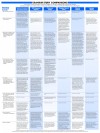October is Breast Cancer Awareness Month, an opportunity for women to learn more about the disease and how they can help screen for it.
Kara Lamb, a breast cancer nurse navigator with the Centra Alan B. Pearson Regional Cancer Center in Lynchburg, provided helpful information about breast cancer.
She said she would like all women to be aware that it is a misconception that the older women get, the lower risk they have of getting breast cancer. Women of all ages are at risk, she said, although some have more risk factors than others.
Risk factors for breast cancer include having a family history of the disease; leading an inactive, sedentary life; eating a diet high in fat, low in fiber, low in fruits and vegetables, high in sugar and high in alcohol; starting menstruation at an early age; stopping menstruation at a later age; taking estrogen replacement therapy long term; taking birth control pills long term; never having children; never breastfeeding; and having radiation to the chest area.
Lamb cautioned that the majority of women diagnosed with breast cancer do not have a family history.
She said Centra follows the screening guidelines of the American Cancer Society. All women should start monthly self-exams and annual clinical breast exams by a provider at age 21. They should begin getting annual mammograms when they turn 40.
Lamb said women with risk factors for breast cancer should discuss with their provider whether or not they need to follow different screening guidelines.
Signs and symptoms of breast cancer may include the following: a lump, with or without pain; a change in the texture of the skin of the breasts; redness or a rash; skin with the look of an orange peel; discharge from the nipple; or a change in the direction of the nipple.
A physician should check any of these signs and symptoms.
Lamb said one reason it’s important for women to do monthly self-exams is so they become familiar with what’s normal for their breasts. That way, if there is a change, they will notice it.
When asked about prevention, Lamb said the best thing women can do is follow the recommended screenings. Early detection is key, she said, and women who have annual mammograms are more likely to have their cancer found early.
She said Centra offers digital mammography, which helps find cancer early and helps find cancer more easily in dense breast tissue.
She urged women to not put off getting a mammogram. She said some women fear it because they think it will be too painful or they think they don’t have the time to get one. Some women feel like what they don’t know won’t hurt them.
The cancer center’s Comprehensive Breast Program was recently recertified by the National Accreditation Program for Breast Centers, she said.
The breast program is implemented by a variety of providers, among them breast radiologists, breast pathologists, oncologists, nurse navigators, a rehabilitation team, a genetic consultant and a clinical trials nurse.
The cancer center makes available genetic counseling for patients with any type of cancer. It also offers information about and facilitation for clinical trials in partnership with the Medical College of Virginia in Richmond.
